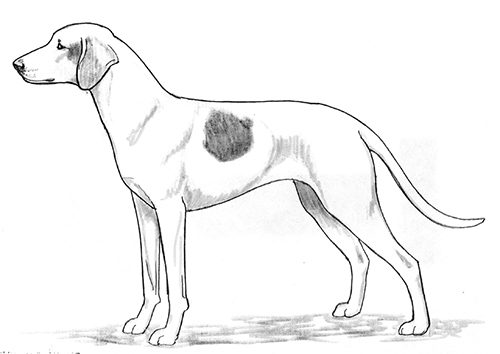Istrian Short-Haired Hound
Scenthound Group
The goals and purposes of this breed standard include: to furnish guidelines for breeders who wish to maintain the quality of their breed and to improve it; to advance this breed to a state of similarity throughout the world; and to act as a guide for judges.
Breeders and judges have the responsibility to avoid any conditions or exaggerations that are detrimental to the health, welfare, essence and soundness of this breed, and must take the responsibility to see that these are not perpetuated.
Any departure from the following should be considered a fault, and the seriousness with which the fault should be regarded should be in exact proportion to its degree and its effect upon the health and welfare of the dog and on the dog’s ability to perform its traditional work.
History
An ancient breed that originated in Croatia, the Istrian Short-Haired Hound is frequently encountered in Istria and neighboring regions, where it is highly prized for fox and hare hunting.
The Istrian Short-Haired Hound was recognized by the United Kennel Club in 2006.
General Appearance
The Istrian Short-Haired Hound has a noble appearance. It is a short coated, white hound with lemon markings, a long head and a supple body.
Characteristics
Gentle, docile, calm and attached to its owner, the breed is lively and enthusiastic when hunting.
Head
SKULL
In profile, the frontal bone is slightly rounded, and the occiput is pronounced. From above, the skull is rather narrow, and there is a distinct frontal furrow. The stop is slight, with no abrupt break.
MUZZLE
The muzzle is long, broad at the base, and tapers progressively towards the nose. The nasal bridge is straight.
TEETH
The Istrian Short-Haired Hound has a complete set of evenly spaced, white teeth meeting in a scissors bite.
Disqualifications: Undershot or overshot bite.
NOSE
Black or dark brown, with wide open nostrils.
EYES
Oval in shape, and as dark brown in color as possible. The eyelids are black or brown. The expression is bright.
Disqualification: Blue eyes.
EARS
The ears are thin, broad at the set on, and taper towards the tips. They are set a little above the line of the eyes. They should not reach to the canine teeth when pulled forward.
Neck
Strong, slightly arched, and set obliquely into the body.
Forequarters
The shoulder blades are long and sloping, well attached to the body.
FORELEGS
The elbows are close to the body, and the legs are perfectly straight. The pasterns are short and very slightly sloping.
Body
The body is approximately 10 percent longer than tall. The chest is well developed, deep and broad, but the point of the sternum is hardly visible. The ribs are well sprung. The topline slopes gently from the withers to the croup. The back is level, broad and muscular. The loin is short and broad. The croup is long and broad, flat or very slightly sloping. The underline rises gently from the sternum to the groin.
Hindquarters
Seen from behind, the thigh, leg, hock and rear pastern are all on the same vertical axis.
HIND LEGS
The upper thighs are short, broad and muscular. The stifle is broad and high set. The lower thigh is long and sloping. The rear pasterns are short.
Feet
More cat than hare, with tight toes, and round pads.
Tail
Strong at the root, tapering towards the tip. The more slender the tail, the more noble the dog appears. The tail is set on high and barely reaches below the hock joint. It is slightly curved upwards.
Coat
Short, fine, dense, and glossy.
Disqualification: Long coat.
Color
Solid white, or white with lemon patches or ticking.
Height and Weight
Ideal height at the withers for males is 19.5 inches. For females, it is 18.5 inches. An adult male will weigh about 40 pounds, a female slightly less.
Gait
Very smooth, even and free.
Eliminating Faults
(An Eliminating Fault is a Fault serious enough that it eliminates the dog from obtaining any awards in a conformation event.)
The presence of any third color, even if it is just a few hairs.
Disqualifications
(A dog with a Disqualification must not be considered for placement in a conformation event, and must be reported to UKC.)
Unilateral or bilateral cryptorchid.
Viciousness or extreme shyness.
Albinism.
Undershot or overshot bite.
Blue eyes.
Long coat.

Looking for a Dog?
Find a dog that will fit your family.
Note: The breeders on this list are not endorsed by UKC.
©Copyright 2006, United Kennel Club
